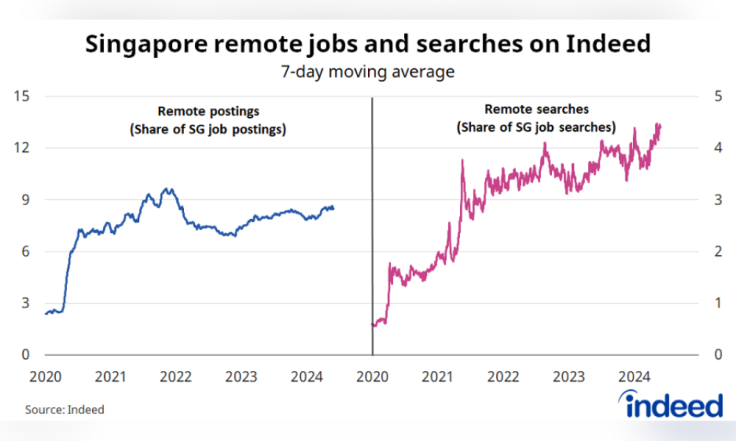The pandemic flipped the work world on its head, making remote gigs the new norm. Jobseekers now think twice before staying in their home state or area.
Remote gigs and flex hours are the new black, killing off the urge to commute or even stay put. Chew Siew Mee, Managing Director of Jobstreet by SEEK in Singapore, noted a steady decline in global talent willing to move abroad.
"Migration to Singapore slid to 4.570 per 1000 in 2022, a slight drop from 2021's 4.609," Chew Siew Mee shared. "Yet, the remote work crowd continues to flock to the city's opulent embrace."
This trend coincides with a significant increase in remote work offerings.
Jobstreet's 2023 data shows remote gigs skyrocketing 15-fold since 2019. Platforms like Remote.com have shattered borders, letting companies snag global talent without moving an inch.
Benefits of Remote Work
The remote work wave is catching on, promising more freedom and balance. Singapore and Malaysia are solidifying this trend with new rules.
Chew Siew Mee added: "These are attributed to job seekers recognizing the benefits of remote work, such as greater autonomy and flexibility in schedules, aiding them in achieving work-life balance."
Moreover, tools provided by Remote.com make it easier for companies to manage a remote workforce, ensuring seamless communication, productivity, and compliance with local employment regulations, regardless of the employees' locations.
The Persisting Interest in Overseas Opportunities
While remote work has reduced the urge to relocate, it hasn't entirely eradicated it. A significant portion of Singaporeans still express a willingness to work abroad, especially in high-tech and mature economies like Australia, China, and Japan.
Chew Siew Mee highlighted: "64% of Singapore respondents expressed a willingness to pursue opportunities abroad."
Young Singaporeans are particularly inclined to seek international experiences, motivated by the desire to learn new skills, build relationships, and prioritize their mental health.
The Rise of Remote Job Listings
Research indicates a growing number of remote job opportunities in Singapore. Indeed's May data reveals 8.5% of job listings flaunt "work from home" or "remote work" tags, echoing jobseekers' clamor. Up 1.6 percentage points since the November 2022 low, this surge isn't random.

Remote bolsters Singaporean firms with top-tier remote hiring infrastructure, drawing global talent with ease. Yet, the maze of international employment laws looms, where Remote steps in as the guiding light.
The platform not only simplifies the hiring process but also ensures that all employment contracts and practices adhere to local laws and regulations, reducing the risk of legal issues. By managing payroll, taxes, and benefits across different countries, Remote allows Singaporean businesses to confidently expand their talent pool while remaining compliant with international standards.

Job Market Stability Amid Economic Challenges
Despite a slight dip in overall job postings, Singapore's job market remains resilient. According to Indeed's APAC Senior Economist, Callam Pickering, job creation in Singapore is stable, with elevated job posting volumes across various sectors.
Callam Pickering stated: "While job postings in May were broadly flat, and lower over the year, Singapore's job market is proving to be resilient in the face of a challenging economic environment."
Emerging Occupations and Recruitment Trends
Certain sectors have seen an increase in job postings, including architecture, medical technician roles, and childcare. However, fields like human resources and electrical engineering have experienced a decline in job openings.
Callam Pickering observed: "Overall, unemployment in Singapore remains low and skill shortages remain common. Recruitment is perhaps easier than it was a year ago but still remains quite challenging by historical standards."
Conclusion: The Future of Work
As remote work continues to solidify its place in our professional lives, its impact on jobseekers' desire to work abroad is evident. While many appreciate the benefits of remote work, the allure of international opportunities persists, driven by the quest for new experiences and professional growth.
If you're thinking of adding Singapore to your digital nomad bucket list just Imagine a place where futuristic skylines meet tropical paradise.
It's an ideal remote work haven. This journey is just heating up as remote work trends shift and shape the future.
Ready to see how Remote can transform your HR processes?
Click here to get started today and experience the future of global HR management.

